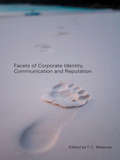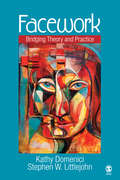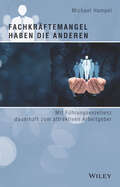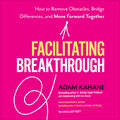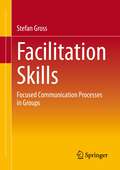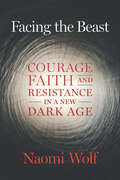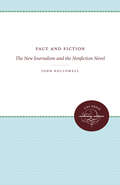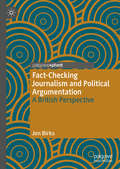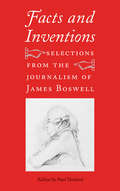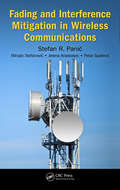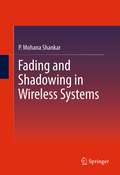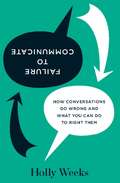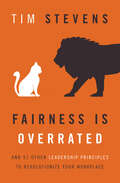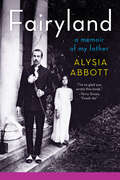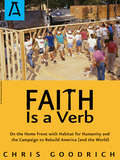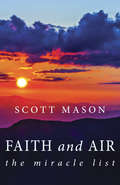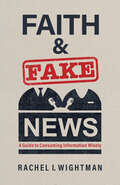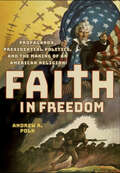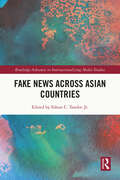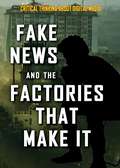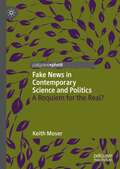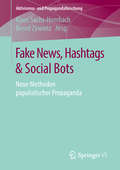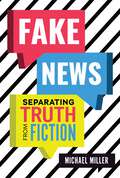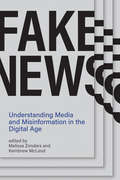- Table View
- List View
Facets of Corporate Identity, Communication and Reputation
by T. C. MelewarCorporate branding and communication is big business. Companies throughout the world invest millions in strategies which aim to reinvent their profile in subtle yet important ways. The investment must be working, but what is it being spent on, and how do these rebranding exercises work?Including contributions from academics and practitioners, this
Facework: Bridging Theory and Practice
by Kathy L. Isaacson Dr Stephen W. LittlejohnWritten in a clear, engaging style Facework: Bridging Theory and Practice introduces a new paradigm that identifies facework as the key to communication within the management of difference. Authors Kathy Domenici and Stephen W. Littlejohn illustrate how facework is a central process in the social construction of both identity and community.
Fachkräftemangel haben die anderen: Mit exzellenter Führung zum attraktiven Arbeitgeber
by Michael HampelMichael Hampel weiß, dass es auch Unternehmen gibt, bei denen die Arbeitskräfte Schlange stehen. Es sind diejenigen, die mit Führungsexzellenz und außergewöhnlichen Rahmenbedingungen glänzen. Diejenigen, die ein entsprechendes Image haben, das nicht nur in bunten Lettern auf zahlreichen Medien zu finden, sondern tatsächlich im Alltag erlebbar ist und sich durch echte Mitarbeiterzufriedenheit und -begeisterung nach außen zeigt. Dieses Buch zeigt, was zu tun ist, um als Arbeitgeber genau dorthin zu kommen. Es vermittelt Unternehmern, Geschäftsführern und Führungskräften ein Bewusstsein dafür, wie ihr Unternehmen in Zukunft geführt werden muss und was sie in allererster Linie selbst vorleben müssen, um eine Transformation, ja einen Kulturwandel hin zum Top-Arbeitgeber zu schaffen. Dazu gehören neben optimalen Rahmenbedingungen und Entwicklungsmöglichkeiten vor allem exzellente Führungsqualitäten auf allen Ebenen. Der Blick richtet sich in diesem Buch deshalb auf das gesamte System des Unternehmens. Es legt die Zusammenhänge offen, die für das Wirken von Führungsexzellenz verantwortlich sind. Deutlich wird, dass diese Wirkung sich wie eine Lawine fortpflanzt - vom Unternehmer angefangen über seine Führungskräfte bis hin zum einzelnen Mitarbeiter. Dafür ein Bewusstsein beim Leser zu entwickeln oder zu schärfen und ihn zu animieren, die daraus folgenden notwendigen Veränderungen im täglichen Handeln vorzunehmen, ist ein Schwerpunkt dieses Buches. Beispiele aus der Erfahrung von Michael Hampel zeigen, wie das gelingen kann. Daneben gibt es auch Zahlen, Daten, Fakten, die belegen, wie unverzichtbar, wie essenziell Führungsexzellenz auf allen Ebenen tatsächlich für den Erfolg, sogar für das Überleben zahlreicher Unternehmen und ganzer Branchen ist. Nicht zuletzt enthält das Buch Schnelltests und Checklisten, die den Weg vom Wissen zum Handeln ebnen.
Facilitating Breakthrough: How to Remove Obstacles, Bridge Differences, and Move Forward Together
by Adam KahaneA new approach to helping teams solve complex and stubborn problems from the acclaimed author of Collaborating with the Enemy. It&’s becoming less straightforward for people to move forward together. They face increasing complexity and decreasing control. They need to work with more people from across more divides. In such situations, the most common ways of advancing—some people telling others what to do, or everyone just doing what they think they need to—aren&’t adequate. One better way is through facilitating. But the most common approaches to facilitating—bossy vertical directing from above or collegial horizontal accompanying from alongside—also aren&’t adequate. They often leave the participants frustrated and yearning for breakthrough. This book describes a new approach: transformative facilitation. Instead of choosing the bossy vertical or collegial horizontal approach: It cycles back and forth between them. Rather than forcing or cajoling, the facilitator removes the obstacles that stand in the way of people contributing and connecting equitably, enabling them to bring their whole selves to the process. This book is for anyone who helps people work together to transform their situation, be it a professional facilitator, manager, consultant, coach, chairperson, organizer, mediator, stakeholder, or friend. It offers a broad and bold vision of the contribution that facilitation can make to helping people collaborate to make progress. Praise for Adam Kahane&’s books &“Thought-provoking discourse on handling difficult situations.&” —Publishers Weekly &“Profound . . . a wise way to negotiate our toughest group, community, and societal challenges.&” —William Ury, New York Times–bestselling coauthor of Getting to Yes
Facilitation Skills: Focused Communication Processes in Groups
by Stefan GrossThis book provides compact and well-founded moderation skills for all those who want to successfully lead meetings, workshops or project rounds. Where this succeeds, communication processes in groups will lead to goal-oriented, effective and efficient results - whether virtually or in presence. The author systematically shows how the exchange of information in such discussion groups can be cleverly thought out, dynamically accompanied and effectively controlled. With goal-oriented questions, methodical impulses and different formats of participation, it is possible to solve problems together in the group, to clarify conflicts, to develop sustainable ideas and to make good decisions. At the end of such events, there is added value for everyone: satisfied participants, sustainable results and a cooperative meeting culture, which form the basis for lasting corporate success. "An enrichment despite the multitude of books on the subject." Dr. Joachim Freimuth, ZOE, 01/2019. "This practical book provides a timely handout for the many challenges facing dynamic facilitation." Prof. Kai Beiderwellen, Mannheim University of Applied Sciences "The book is an invitation to deepen and reflexively develop one's own role." Dr. Wolfgang Widulle, Socialnet.de New in the second edition: chapters on virtual facilitation, collaborative learning and tried and tested structural aids, templates, checklists and project outlines as downloads.
Facing the Beast: Courage, Faith, and Resistance in a New Dark Age
by Naomi WolfFrom New York Times bestselling author Naomi Wolf, Facing the Beast is a devastating, detailed account of wrongthink, deplatforming, and an unexpected political, personal, and spiritual transformation that followed during one of the most divisive times in American history.In this uncompromising investigation into today&’s most urgent issues, Naomi Wolf uses her own wildly politicized pilgrimage—from New York Times bestselling author and high-level Democratic consultant to a journalist cast out from the elite political and social circles she once moved through—as a stunning narrative framework that is both chilling and incisive.Wolf&’s sin? Doing the job that good journalists once prided themselves on: asking questions, challenging authority, and, during one of the most politically divisive moments in modern history, exposing the many failures of the public health response during the COVID-19 pandemic by chronicling the dangerous descent of our democracy into tyranny, censorship, and totalitarianism.Unable to remain silent in the shadows and unwilling to collude with the mainstream, Wolf bravely covers topics that few other writers dare to address critically for fear of being deplatformed. Facing the Beast explores reproductive rights, medical freedom, the uncurious thought-policing of the &“progressive&” left, the Second Amendment, the criminal relationship between the FDA and Pfizer—Wolf&’s clear writing repeatedly shines light in the dark corners of our fractured society.A decades-long champion of free speech, freedom of the press, and the Constitution, Wolf found herself not only in the midst of a political rebirth but a spiritual transformation as well—one in which the events of the day could only be described in terms of good, evil, and a metaphysical quest on the nature of reality.For readers of Matt Taibbi, Glenn Greenwald, and Bari Weiss, Facing the Beast is a fearless indictment of legacy media and the political class, as well as a brutal reminder that searching for and defending the truth can be dangerous.&“Naomi Wolf is one of the bravest, clearest-thinking people I know. The reason you hear the forces of repression so desperately trying to dismiss her is because she is right.&”—Tucker Carlson
Facsimiles and the History of Shakespeare Editing (Elements in Shakespeare and Text)
by Paul SalzmanIs a facsimile an edition? In answering this question in relation to Shakespeare, and to early modern writing in general, the author explores the interrelationship between the beginning of the conventional process of collecting and editing Shakespeare's plays and the increasing sophistication of facsimiles. While recent scholarship has offered a detailed account of how Shakespeare was edited in the eighteenth century, the parallel process of the 'exact' reproduction of his texts has been largely ignored. The author will explain how facsimiles moved during the eighteenth and nineteenth century from hand drawn, traced, and type facsimiles to the advent of photographical facsimiles in the mid nineteenth century. Facsimiles can be seen as a barometer of the reverence accorded to the idea of an authentic Shakespeare text, and also of the desire to possess, if not original texts, then reproductions of them.
Fact and Fiction: The New Journalism and the Nonfiction Novel
by John HollowellJournalists and novelists responded to the pervasive social changes of the 1960s in America with a variety of experiments in nonfiction. Those who have praised the vitality of the new journalism have seen it as a fusion of the journalist's passion for detail and the novelist's moral vision. Hollowell presents a critically sharp portrait of what the new journalists and novelists are doing and why. The author concludes that future writing will further obscure the difference between fact and fiction.Originally published in 1977.A UNC Press Enduring Edition -- UNC Press Enduring Editions use the latest in digital technology to make available again books from our distinguished backlist that were previously out of print. These editions are published unaltered from the original, and are presented in affordable paperback formats, bringing readers both historical and cultural value.
Fact-Checking Journalism and Political Argumentation: A British Perspective
by Jen BirksThis timely book examines the role of fact-checking journalism within political policy debates, and its potential contribution to public engagement. Understanding facts not to operate in a political vacuum, the book argues for a wide remit for fact-checking journalism beyond empirically-checkable facts, to include the causal relationships and predictions that form part of wider political arguments and are central to electoral pledges. Whilst these statements cannot be proven or disproven, fact-checking can, and sometimes does, ask pertinent critical questions about the premises of those claims and arguments. The analysis centres on the three dedicated national British fact-checkers during the UK’s 2017 snap general election, including their activity and engagement on Twitter. The book also makes a close political discourse and argumentation analysis of three key issue debates in flagship reporting from Channel 4 News and the BBC.
Facts and Inventions
by James Boswell Paul TankardJames Boswell (1740-1795), best known as the biographer of Samuel Johnson, was also a lawyer, journalist, diarist, and an insightful chronicler of a pivotal epoch in Western history. This fascinating collection, edited by Paul Tankard, presents a generous and varied selection of Boswell's journalistic writings, most of which have not been published since the eighteenth century. It offers a new angle on the history of journalism, an idiosyncratic view of literature, politics, and public life in late eighteenth-century Britain, and an original perspective on a complex and engaging literary personality.
Fading and Interference Mitigation in Wireless Communications
by Stefan Panic Mihajlo Stefanovic Jelena Anastasov Petar SpalevicFading and Interference Mitigation in Wireless Communications will help readers stay up to date with recent developments in the performance analysis of space diversity reception over fading channels in the presence of cochannel interference. It presents a unified method for computing the performance of digital communication systems characterized by a variety of modulation and detection types and channel models. The book includes coverage of multichannel reception in various fading environments, influence of cochannel interference, and macrodiversity reception when channels are simultaneously affected by various types of fading and shadowing.
Fading and Shadowing in Wireless Systems
by P. Mohana ShankarThe study of signal transmission and deterioration in signal characteristics as the signal propagates through wireless channels is of great significance. The book presents a comprehensive view of channel degradation arising from fading and shadowing. Various statistical models including simple, hybrid, compound, complex and cascaded ones are presented with detailed derivations along with measures to quantify the deterioration such as the amount of fading, error rates and outage probabilities. The models range from the Rayleigh and Rician through Suzuki, generalized K, cascaded and alpha-mu and similar ones. This is followed by the analysis of mitigation of fading and shadowing through diversity (simple, hybrid, micro- and macro- level) and combining algorithms. The density and distribution functions, error rates and outages are derived and results analyzed to quantify the improvements. The effects of co-channel interference before and after the implementation of diversity are also analyzed. To facilitate easy understanding of the models and analysis, the background information in terms of probability and random variables is presented with relevant derivations of densities of linear and nonlinear transformation of random variables, the sums, products, ratios as well as order statistics of random variables of all types. The book also provides material on digital modems of interest in wireless systems. Thus, the book with 1100+ equations and 350+ Matlab generated figures and tables is an ideal source for students, educators, researchers and professionals in wireless communications allowing access to information currently unavailable.
Failure to Communicate
by Holly WeeksYour stomach's churning; you're hyperventilating -- you're in a badly deteriorating conversation at work. Such exchanges, which run the gamut from firing subordinates to parrying verbal attacks from colleagues, are so loaded with anger, confusion, and fear that most people handle them poorly: they avoid them, clamp down, or give in.But dodging issues, appeasing difficult people, and mishandling tough encounters all carry a high price for managers and companies -- in the form of damaged relationships, ruined careers, and intensified problems.In Failure to Communicate, Holly Weeks shows how to master the combat mentality, emotional maelstrom, and confusion that poison difficult conversations. Drawing on her many years as a consultant and coach to leaders and executives, the author explains:· Why we turn to ineffective tactics when the heat is on· How to avoid the worst pitfalls of difficult conversations, and how to pull yourself out if you fall in· Ways to regain your balance and inject respect into stressful conversations, even when you've been confronted, infuriated, or wronged· Strategies for mitigating aggression and defensiveness, and for clearing the fog of misconceptions· How to get through the hardest conversations with your reputation and relationships intactUsing proven techniques paired with detailed real-life examples, Weeks equips you with the strategies and practices you need to transform even the toughest conversations.
Fairness Is Overrated: And 51 Other Leadership Principles to Revolutionize Your Workplace
by Tim StevensDiscover the tools of leadership to revolutionize your workplace.Tim Stevens traveled an alternative road—leaving high school and immediately joining a national non-profit organization. He rose quickly through the ranks of leadership, but nine years later left it all behind to help an upstart church get its footing. During the 20 years Stevens served as Executive Pastor at Granger Community Church near South Bend, Indiana, the ministry grew from a congregation of 300 to more than 5,000; from a staff of five to more than 130; with a preschool, restaurant, three campuses and more than 1,800 new churches planted in southern India. Leaders learn by leading. Stevens knows that creating a healthy and successful organization requires throwing out the conventional instruction manual and writing one that balances practical lessons, spiritual truths, and twenty-first century realities—exactly what you will find in Fairness Is Overrated.Stevens, now an executive with the Vanderbloemen Search Group, takes his lifetime of service and dispenses with conventional wisdom. Short, powerful chapters end with actionable discussion questions. Four pillars hold up every successful leader: Be a person of integrity. Identify the right people around you. Build a great culture. Lead through crisis.This is a manual of doing, not talking. No fluff, no stale inspirational platitudes. It’s time to move past planning and kick-start Monday into action.
Fairyland: A Memoir of My Father
by Alysia AbbottFinalist for a Lambda Literary Award and a San Francisco Chronicle Best Book of the Year In this vibrant memoir, Alysia Abbott recounts growing up in 1970s San Francisco with Steve Abbott, a gay, single father during an era when that was rare. Reconstructing their time together from a remarkable cache of Steve’s writings, Alysia gives us an unforgettable portrait of a tumultuous, historic period in San Francisco as well as an exquisitely moving account of a father’s legacy and a daughter’s love.
Faith Is a Verb: On the Home Front with Habitat for Humanity and the Campaign to Rebuild America (and the World)
by Chris GoodrichFaith is a Verb is both an account of the author's five years volunteering with Habitat for Humanity and a history of the organization, which Goodrich sees as a model institution founded on grassroots, Jeffersonian principles. The reader looks over his shoulder as Goodrich helps restore a burned-out drug den to its Victorian glory in Bridgeport, Connecticut; understands the yawning gap between the rich and poor as he straightens nails with an impoverished teenager in the Dominican Republic; senses the importance of volunteer work as he watches, while laying a stone foundation in Paraguay, the Twin Towers fall on 9/11.Goodrich traces Habitat's history back to an unsung American hero, Clarence Jordan, who in the 1940's founded a Christian community in Georgia, Koinonia Farm, dedicated to social and economic justice. Millard Fuller, a millionaire businessman, visited at Koinonia in the early 1970's, and under Jordan's guidance realized he was a "money-holic," gave away his fortune, and in 1976 founded Habitat for Humanity. Goodrich shows how Fuller's Southern Baptist, Friday-night-revival personality helped turn Habitat into the world's largest non-governmental home-builder, his inspirational leadership greatly abetted by the support of former president Jimmy Carter. In a postscript the author describes the crisis Habitat faced when Fuller was forced out following allegations of sexual harassment in 2005. This edition updates the story to 2013, when the organization had "helped build or repair more than 600,000 houses" world-wide.What readers have said about Faith is a Verb:"A great record of how [Habitat for Humanity] got underway and became so significant." -- Tony Campolo, PhD., author of Pray Give Go Do"[S]pirited and intimate....Anyone interested in learning about or volunteering for the organization will find his account richly detailed." -- David Bornstein, author of How to Change the World
Faith and Air: The Miracle List
by Scott MasonA longtime journalist grounded in facts confronts stories that ask for faith. Throughout his thirty years on the air, television reporter Scott Mason has interviewed countless people who unexpectedly offered up miracle stories. Such as the legendary golf broadcaster who makes for a wonderful personality profile—and then says, “Oh, and by the way, I died and came back to life.” Or the sole survivor of a plane crash who describes his harrowing ordeal—and tells of a radiant vision he says he witnessed while catapulting through the fuselage. One after another the miracle stories kept coming, but Scott Mason suspected these stories would never find their way onto the air. So he made a miracle list and dug deeper into these intriguing accounts on his own. As he pursues the leads throughout this book, Scott shares a compelling narrative of fact and faith and his personal struggle to balance them both.
Faith and Fake News: A Guide to Consuming Information Wisely
by Rachel I. WightmanShare if you love Jesus. Scroll past if you follow the devil. Most Christians have seen something asinine like this on Facebook and rightly dismissed it. But not every post on social media is so obviously absurd. As online spaces increase in importance, it is urgent that we as Christians consider how to love our neighbors on the internet—and this includes sharing the truth.Rachel I. Wightman has seen this problem firsthand as a librarian with over a decade of experience instructing students in information literacy. In Faith and Fake News, she shares her expertise with average Christians. This timely and essential guide explains the information landscape and its tendency toward thought bubbles, discusses techniques for fact-checking and evaluating sources, and offers suggestions on ways to engage with our neighbors online while bearing witness to Christ and the truth.
Faith in Freedom: Propaganda, Presidential Politics, and the Making of an American Religion
by Andrew R. PolkIn Faith in Freedom, Andrew R. Polk argues that the American civil religion so many have identified as indigenous to the founding ideology was, in fact, the result of a strategic campaign of religious propaganda. Far from being the natural result of the nation's religious underpinning or the later spiritual machinations of conservative Protestants, American civil religion and the resultant "Christian nationalism" of today were crafted by secular elites in the middle of the twentieth century. Polk's genealogy of the national motto, "In God We Trust," revises the very meaning of the contemporary American nation.Polk shows how Presidents Franklin D. Roosevelt, Harry S Truman, and Dwight D. Eisenhower, working with politicians, advertising executives, and military public relations experts, exploited denominational religious affiliations and beliefs in order to unite Americans during the Second World War and, then, the early Cold War. Armed opposition to the Soviet Union was coupled with militant support for free economic markets, local control of education and housing, and liberties of speech and worship. These preferences were cultivated by state actors so as to support a set of right-wing positions including anti-communism, the Jim Crow status quo, and limited taxation and regulation.Faith in Freedom is a pioneering work of American religious history. By assessing the ideas, policies, and actions of three US Presidents and their White House staff, Polk sheds light on the origins of the ideological, religious, and partisan divides that describe the American polity today.
Fake News Across Asian Countries (Routledge Advances in Internationalizing Media Studies)
by Edson C. TandocThis book integrates insights from studies conducted across Asia to provide a comprehensive account of the fake news problem in the region.Emerging from a study on how Singapore stakeholders define, determine, and deal with online falsehoods, the volume expands to cover numerous Asian contexts, all of which have experienced the problem in not only similar but also unique ways, coupled with diverse cultures and media regulatory contexts. Drawing from specific examples and case studies to demonstrate the real-world manifestation of the concepts and theories on fake news, the book grounds academic research in lived experiences.This volume will interest journalism scholars and undergraduate and postgraduate students in the areas of media studies, mass communication, digital media, media literacy, Asian studies, and political communication.
Fake News and the Factories that Make It (Critical Thinking About Digital Media)
by Kristina Lyn HeitkampOnce on the fringe, fake news has become mainstream. From bogus social media accounts to Russian troll factories, phony news muddies the social and political discourse, and is a threat to our democracy. This high-interest book defines fake news and reveals the people behind the spread of disinformation. This text directly correlates with state journalism standards about developing media literacy. Readers will also glimpse the future of fake news and the alarming technologies used to make it, such as face-morphing technology. This book will help readers navigate the messy world of fake news.
Fake News in Contemporary Science and Politics: A Requiem for the Real?
by Keith MoserThis transdisciplinary book investigates the profound repercussions of living in a post-truth world in which 'alternative facts' and post-truth knowledge claims, often bordering on the absurd, have replaced the real in the collective imagination of millions of people around the planet. Through discussions on climate change denial, the anti-vaccination movement, the January 6th Insurrection and the Russia-Ukraine War, this study explores the gravity of the current 'infodemic,' or the increasing inability of a large segment of the population to distinguish between reality and misrepresentation, and the destabilizing impact this infodemic has on democratic models of governance around the globe, coinciding with the rise of autocratic forms of populism.
Fake News, Hashtags & Social Bots: Neue Methoden populistischer Propaganda (Aktivismus- und Propagandaforschung)
by Klaus Sachs-Hombach Bernd ZywietzDer Band versammelt Beiträge zum Thema der gegenwärtigen „digitalen“ Propaganda, wie sie im Kontext des Populismus eine besondere Rolle spielt. Sie wird als politisch-mediales Phänomen analysiert und als gesellschaftlich-kommunikatives Herausforderung: dies hinsichtlich der Sorge vor der einseitigen Beeinflussung einer neuen, fragmentierten „Masse“ im Netz sowie um die für medienvermittelte Demokratien fundamentale Möglichkeit des vertrauensvollen Austausches von Informationen und Meinungen auf Basis diskursethischer Prinzipien.
Fake News: Separating Truth from Fiction
by Michael MillerWhile popularized by President Donald Trump, the term "fake news" actually originated toward the end of the 19th century, in an era of rampant yellow journalism. Since then, it has come to encompass a broad universe of news stories and marketing strategies ranging from outright lies, propaganda, and conspiracy theories to hoaxes, opinion pieces, and satire—all facilitated and manipulated by social media platforms. This title explores journalistic and fact-checking standards, Constitutional protections, and real-world case studies, helping readers identify the mechanics, perpetrators, motives, and psychology of fake news. A final chapter explores methods for assessing and avoiding the spread of fake news.
Fake News: Understanding Media and Misinformation in the Digital Age (Information Policy)
by Kembrew McLeod Melissa ZimdarsNew perspectives on the misinformation ecosystem that is the production and circulation of fake news.What is fake news? Is it an item on Breitbart, an article in The Onion, an outright falsehood disseminated via Russian bot, or a catchphrase used by a politician to discredit a story he doesn't like? This book examines the real fake news: the constant flow of purposefully crafted, sensational, emotionally charged, misleading or totally fabricated information that mimics the form of mainstream news. Rather than viewing fake news through a single lens, the book maps the various kinds of misinformation through several different disciplinary perspectives, taking into account the overlapping contexts of politics, technology, and journalism.The contributors consider topics including fake news as “disorganized” propaganda; folkloric falsehood in the “Pizzagate” conspiracy; native advertising as counterfeit news; the limitations of regulatory reform and technological solutionism; Reddit's enabling of fake news; the psychological mechanisms by which people make sense of information; and the evolution of fake news in America. A section on media hoaxes and satire features an oral history of and an interview with prankster-activists the Yes Men, famous for parodies that reveal hidden truths. Finally, contributors consider possible solutions to the complex problem of fake news—ways to mitigate its spread, to teach students to find factually accurate information, and to go beyond fact-checking.ContributorsMark Andrejevic, Benjamin Burroughs, Nicholas Bowman, Mark Brewin, Elizabeth Cohen, Colin Doty, Dan Faltesek, Johan Farkas, Cherian George, Tarleton Gillespie, Dawn R. Gilpin, Gina Giotta, Theodore Glasser, Amanda Ann Klein, Paul Levinson, Adrienne Massanari, Sophia A. McClennen, Kembrew McLeod, Panagiotis Takis Metaxas, Paul Mihailidis, Benjamin Peters, Whitney Phillips, Victor Pickard, Danielle Polage, Stephanie Ricker Schulte, Leslie-Jean Thornton, Anita Varma, Claire Wardle, Melissa Zimdars, Sheng Zou
